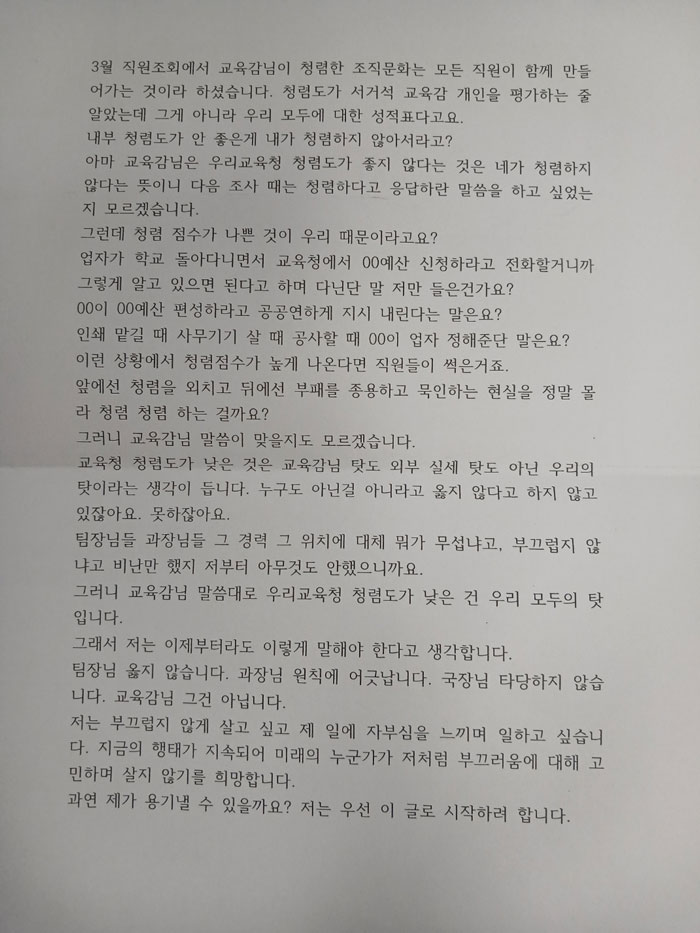전북교육청의 청렴도 문제를 두고 내부 직원이 작성한 것으로 추정되는 익명의 고발문이 본청 팀장 및 과장들에게 우편으로 전달되며 논란이 확산되고 있다. 전국공무원노동조합 교육청본부 전북교육청지부는 이에 대한 제보를 받기 위해 공식 웹자보도 배포했다.
해당 고발문은 "청렴한 조직문화는 모든 직원이 함께 만들어가는 것"이라는 서거석 교육감의 지난 직원조회 발언을 언급하며 시작된다. 작성자는 “청렴도가 낮은 것이 정말 직원 개개인의 탓이냐”고 반문하며, 교육청 내부에서 공공연하게 이뤄지고 있다는 부당한 지시와 예산 편성 관행, 특정 업체 밀어주기 등의 구체적인 사례를 열거했다.
작성자는 “업자가 학교에 들어가며 교육청에서 예산 신청하라고 전화할 거라는 말을 들은 적이 있지 않느냐”고 지적하며, 겉으로는 청렴을 외치면서 실제로는 부패를 묵인하는 조직 문화의 이중성을 비판했다. 이어 “이런 상황에서 청렴도 점수가 높게 나온다면, 오히려 직원들이 썩은 것”이라고 자조적인 표현을 덧붙였다.
또한 그는 “과연 청렴하라고 말하는 사람들이 본인 스스로는 떳떳한가”라고 되묻고, “그동안 나 또한 아무것도 하지 않았기에 청렴도가 낮은 건 우리 모두의 탓”이라며 반성과 함께 변화의 필요성을 강조했다. “이제는 팀장에게, 과장에게, 국장에게, 교육감에게 ‘그건 아닙니다’라고 말할 수 있어야 한다”며, 부끄럽지 않게 일하고 싶다는 각오를 드러냈다.
전국공무원노조 전북교육청지부는 이와 관련해 각종 사업 강요, 특정업체 지정, 불필요한 예산 집행, 인사 청탁, 뒷거래 등 부패 행위에 대한 제보를 받고 있다. 웹자보에는 “청렴했던 전북교육의 실종… 알면서 침묵은 범죄 동조입니다”라는 문구와 함께, 제보자의 신상정보는 공개되지 않는다는 안내가 실려 있다.
노조 관계자는 “혼자 고민하지 말고 함께 해 달라는 의미에서 제보를 받는다”며 “공익을 위한 내부 고발이 위축되지 않도록 적극적으로 보호할 것”이라고 밝혔다.
한편, 전북교육신문은 지난 기사에서 “전북교육청, 청렴도 3등급… 체감도는 하위권 어떻게 극복할 것인가”라는 제목으로, 교육청이 추진하는 각종 시설 사업에서 예산 집행 및 사업 선정 과정의 투명성 부족 문제를 지적한 바 있다. 예산 배정 과정에서도 학교와 교육지원청, 도교육청 간 공식 절차가 무시되고, 정치인을 통한 청탁 방식이 우선시된다는 비판이 제기됐으며, 일부 학교장들이 해당 문제를 제보하며 실태를 알렸다고 보도했다.
뿐만아니라 실제 익명의 고발문에 언급된 것과 유사한 일을 제보받은바 있다. 전북 도내에 위치한 모 중학교 교장은 "업자가 교육청의 00과 친분을 과시하며 학교에 찾아와서 학교에서 필요한 예산이 있으면 확보해주겠다"고 제안하며 "대신에 자신들과 수의계약을 해줘야 한다"는 제안을 받은바 있지만 "옳지 못하다고 판단해" 추진하지 않았다고 증언했다.
익명의 고발문과 노조의 제보 접수 활동이 실제 조직 문화 개선으로 이어질 수 있을지 주목된다.

An anonymous complaint letter, presumed to be written by an internal employee, has been sent to the team leaders and managers of the North Jeolla Provincial Office of Education, stirring controversy over the issue of integrity within the office. The North Jeolla branch of the Korean Government Employees' Union has released an official notice on its website to receive reports on this matter.
The complaint letter begins by referring to the superintendent's previous statement at a staff meeting that "a clean organizational culture is something that all employees create together." The author questions, "Is it really the fault of each individual employee that the level of integrity is low?" and lists specific examples of unfair directives, budget allocation practices, and favoritism towards certain companies that are openly taking place within the education office.
The author points out, "Hasn't anyone heard that a contractor will call the education office to apply for a budget when they enter a school?" and criticizes the hypocrisy of the organizational culture that outwardly advocates for integrity but tacitly condones corruption. The author adds, "If the integrity score is high in such a situation, it means that the employees are rotten."
The author also asks, "Are those who preach integrity really upright themselves?" and admits, "The low level of integrity is the fault of all of us, including myself, who have done nothing." The author emphasizes the need for change, stating, "We should now be able to say 'that's not right' to team leaders, managers, directors, and superintendents," and expresses a determination to work without shame.
The North Jeolla branch of the Korean Government Employees' Union is receiving reports on various corrupt practices such as forced business operations, designation of specific companies, unnecessary budget execution, personnel requests, and backdoor deals. The notice on the website states, "Silence in the face of known corruption is complicity in crime," and assures that the identity of the informant will not be disclosed.
A union official said, "We are receiving reports in the hope that people will not struggle alone but work together," and promised to actively protect whistleblowers for the public interest.
Meanwhile, the North Jeolla Education Newspaper previously pointed out the lack of transparency in the budget execution and project selection process in various facility projects promoted by the education office in an article titled "North Jeolla Office of Education, 3rd Grade in Integrity... How to Overcome the Lower Ranks in Perception." Criticism was raised that the official procedures between schools, education support offices, and provincial education offices were ignored in the budget allocation process, and that the method of requesting through politicians was prioritized. Some principals reported this issue, revealing the situation.
The newspaper also received reports of incidents similar to those mentioned in the anonymous complaint letter. The principal of a middle school located in North Jeolla Province testified that a contractor visited the school, flaunting his close relationship with a department in the education office, and offered to secure the necessary budget for the school, but only if the school signed a contract with him. However, the principal decided not to proceed with this, judging it to be inappropriate.
It remains to be seen whether the anonymous complaint letter and the union's reporting activities will lead to actual improvements in the organizational culture.


